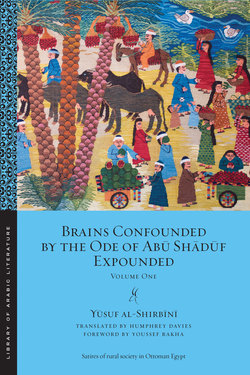Читать книгу Brains Confounded by the Ode of Abū Shādūf Expounded - Yūsuf al-Shirbīnī - Страница 12
На сайте Литреса книга снята с продажи.
ОглавлениеNOTE ON THE TEXT
The present translation is a revised version of that published in 2007.71 In revising the translation, I have sought to correct errors in its predecessor. I have also shortened the notes in keeping with the guidelines of the Library of Arabic Literature; areas that have been systematically cut in the interests of reducing the academic apparatus are the two particularly complex areas of the sourcing of prophetic Traditions and the tracing of sources for prose stories and topoi. I have, however, been able to increase the number of identifications of poets cited anonymously or erroneously by al-Shirbīnī (though, again in the interest of reducing the academic apparatus, ambiguous and disputed attributions have largely been omitted); this has been possible due only to the efforts of Geert Jan van Gelder, to whom I am greatly indebted, for this as for much else.
In addition, I have removed from the endnotes most references related to the lexicology of Egyptian words. Interested readers are referred to a lexicon that I have compiled dealing with words not found in Martin Hinds and El-Said Badawi’s A Dictionary of Egyptian Arabic.72 Those who wish to study in greater depth what Brains Confounded can tell us about Egyptian Arabic in al-Shirbīnī’s day are referred to my dissertation on the topic.73
The difficulties of rendering poetry into another language are well known; I have tried, at least, to use rhyme and rhythm in these passages, though without seeking to produce anything that imitates, for example, Arabic meter, but because Arabic hemistichs often appear as a single line in the translation, verse consisting of a single line in Arabic (two in English) is not usually rhymed. The reader should also bear in mind that much of the poetry, whether a quotation or made up by the author, was deliberately chosen or written to be bad. If such verse reads as doggerel, the translation has achieved its purpose.
Rhymed prose—phrases, usually short, that rhyme but are not metered—poses a special problem, as English has no equivalent category. Its role in the structure of the work is, however, important, because it is used at moments of heightened emotional or rhetorical tension or to lend authority to and drive home an argument elaborated in immediately preceding unrhymed prose. I have used rhyme, indeed, but also assonance, alliteration, and rhythm, to distinguish many of these passages. I have also been influenced, however, by Newmark’s theories of “importance,” according to which “the more important the language of the text, the more closely it should be translated” (Newmark, Translation, 1)—“important” language being defined, in this context, as “language that denotes what is exceptionally valuable, significant, necessary, or permanent” (idem, 2). I have therefore sacrificed, on occasion, the aesthetic demands of the text to the need for literalism. This is the case with passages that convey facts or opinions whose significance I believe to be too great, from the author’s standpoint, to permit the massaging that inevitably occurs in the search for aesthetic equivalence. An example of such a passage is that beginning “Indeed, they never escape their condition of uncouthness because …,” in which the author provides an initial description, in rhymed prose, of the countryman that is critical for an understanding of his attitude towards him (§2.3); this and equivalent passages I have rendered in unrhymed prose. I have made no attempt to rhyme the “Ode of Abū Shādūf” itself for the same reasons.
English is the metalanguage of this series. In the translation, technical terms, such as those referring to rural officials and rhetorical devices, have been rendered by English equivalents (and their meanings explained in greater detail in the Glossary). Similarly, the titles of books are given in English first, and the use of transliterated Arabic has been reduced to a minimum. Nevertheless, Brains Confounded contains passages of textual commentary (sharḥ) that are central to its purpose. In our translation we have borne in mind that these commentaries on specific verses are commentaries on Arabic and not on English texts and that it is Arabic words and not English words that are at issue. When the commentator discusses ʿadīm (colloquial for ʿaẓīm), he is not discussing the English word “mighty”; in such cases, the English translation is an approximation whose lexical boundaries differ, in all likelihood, from those of its Arabic “equivalent.” In these passages, therefore, Arabic has been privileged, in the sense that the verses in question are reproduced in transcription in the English text and precede their English translations, both when they first occur and in the commentary. The reader who does not know Arabic may well allow his eye to skip these transcriptions; they are, however, essential to the logic of the text.
